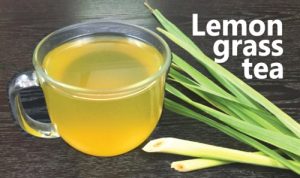
Source: Prof. Raphael Nyarkotey Obu
Lemongrass, also called citronella, is a tall, stalky plant. It has a fresh, lemony aroma and a citrus flavour. It is a common ingredient in Thai cooking and it is bug repellent.
Lemongrass essential oil is used in aromatherapy to freshen the air, reduce stress and uplift moods.
Lemongrass is also used as a folk remedy to promote sleep, relieve pain and boost immunity. One of the most popular ways to enjoy lemongrass is as tea.
Antioxidant, antimicrobial, anti-inflammatory
A study by Cheel et al., (2005) found that lemongrass has antioxidants, which can avert free radicals in the body. Some of these antioxidants are chlorogenic acid, isoorientin, and swertiajaponin.
These antioxidants could prevent the dysfunction of cells inside the coronary arteries.ess and uplift moods.
Lemongrass is also used as a folk remedy to promote sleep, relieve pain and boost immunity. One of the most popular ways to enjoy lemongrass is as tea.
Antioxidant, antimicrobial, anti-inflammatory
A study by Cheel et al., (2005) found that lemongrass has antioxidants, which can avert free radicals in the body. Some of these antioxidants are chlorogenic acid, isoorientin, and swertiajaponin.
These antioxidants could prevent the dysfunction of cells inside the coronary arteries.
One study by Chaudhari et al., (2012) found that Lemongrass tea could treat oral infections and cavities, due to its antimicrobial properties.
The oil was found to demonstrate antimicrobial properties against Streptococcus mutans bacteria, the bacteria most responsible for tooth decay.
A previous study by Ahmad and Viljoen (2005) found lemongrass oil and silver ions could work together against many types of bacteria and fungi in vitro.
The Memorial Sloan Kettering Cancer Centre found that two main compounds in lemongrass, citral and geranial, were responsible for its anti-inflammatory benefits, as they could avert the release of some inflammation-causing indicators in the body.
The centre also found that the citral in lemongrass could also be a potent anti-cancer agent. Apart from that, there are so many ingredients in lemongrass that could wade off cancer. This is done by boosting the immune system.
Lemongrass tea is sometimes used as an adjuvant therapy during chemotherapy and radiation. It should only be used under the guidance of an oncologist.
Promote healthy digestion
Studies have found that a cup of lemongrass tea is a natural therapy for upset stomach, stomach cramping, and other digestive problems.
found that lemongrass could be potent against gastric ulcers.
The essential oil of lemongrass leaves could help protect the stomach lining against damage from aspirin and ethanol. Regular aspirin use is a common cause of gastric ulcers.
Diuretic
Lemongrass is a known diuretic. A diuretic allows you to urinate more often, helping your body to get rid of excess fluid and sodium. Diuretics are often prescribed if you have heart failure, liver failure or edema. Hence, it could be a natural diuretic.
For instance, one study by Mirza et al., (2001) on rats found lemongrass tea as a potent diuretic similar to green tea, without causing organ damage or other side effects.
Reduce high systolic blood pressure
An observational study by Ullah et al., (2012) used 72 male volunteers and prescribed either lemongrass tea or green tea to drink. The study found that those who took the lemongrass tea had a moderate drop in systolic blood pressure and a mild increase in diastolic blood pressure. They also had a significantly lower heart rate.
This is good news for those with high systolic blood pressure. However, caution is given to men with heart problems to use lemongrass in moderation.
This can help avoid dangerous drops in heart rate or increased diastolic pressure.
Shah et al., (2011) found that lemongrass oil was helpful to cool the body. This in turn could help as a natural remedy for menstrual cramps, bloating and hot flashes.
Lemongrass is generally considered safe to use in food amounts, including the amount typically used to make tea.
Potential side effects of lemongrass include dizziness, increased hunger, dry mouth, increased urination and tiredness. Some people may be allergic to lemongrass. Get emergency help if you experience allergic reaction symptoms, such as, a rash, itching, difficulty breathing and a rapid heart rate.
You should not drink lemongrass tea if you are pregnant; you take prescription diuretics; you have a low heart rate and have low potassium levels.
Bottom line
Most studies on lemongrass used the oil, not lemongrass tea. But you can use the tea as well, just in case you do not get the oil. Lemongrass tea or lemongrass tea bags can be found at most natural food stores or online.
You can also add to your food by cooking with it. Add a stalk or two to your favourite soup — it pairs well with chicken noodles. You can also add it to poultry or fish before baking.
The writer is Professor, Naturopathic Healthcare/President, Nyarkotey College of Holistic Medicine and Technology (NUCHMT)/African Naturopathic Foundation. He adheres to strict sourcing, studies and academic papers in his articles, which are for educational purposes only, and not medical advice for treatment.
E-mail: collegeofholisticmedicine@gmail.com.
Source: www.graphic.com.gh








